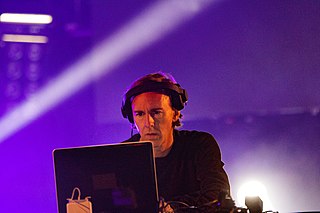House is a genre of electronic dance music characterized by a repetitive four-on-the-floor beat and a typical tempo of 115–130 beats per minute. It was created by DJs and music producers from Chicago's Black gay underground club culture and evolved slowly in the early/mid 1980s as DJs began altering disco songs to give them a more mechanical beat. By early 1988, House became mainstream and supplanted the typical 80s music beat.

Jeff Mills, also known as "theWizard", is an American DJ, record producer, and composer. In the late 1980s Mills founded the techno collective Underground Resistance with fellow Detroit techno producers 'Mad' Mike Banks and Robert Hood but left the group to pursue a career as a solo artist in the early 90s. Mills founded the Chicago based Axis Records in 1992, which is responsible for the release of much of his solo work.

Tresor is a techno nightclub in Berlin and a record label.
Joey Beltram is an American DJ and music producer, best known for his pioneering singles "Energy Flash" and "Mentasm" and for remixing Human Resource's "Dominator".

Richard "Richie" Hawtin is a British-Canadian electronic musician and DJ. He became involved with Detroit techno's second wave in the early 1990s, and has been a leading exponent of minimal techno since the mid-1990s. He became known for his recordings under the Plastikman and F.U.S.E. aliases. Under the latter, he released his debut album Dimension Intrusion (1993) as part of Warp's Artificial Intelligence series.
Detroit techno is a type of techno music that generally includes the first techno productions by Detroit-based artists during the 1980s and early 1990s. Prominent Detroit techno artists include Juan Atkins, Eddie Fowlkes, Derrick May, Jeff Mills, Kevin Saunderson, Blake Baxter, Drexciya, Mike Banks, James Pennington and Robert Hood. Artists like Terrence Parker and his lead vocalist, Nicole Gregory, set the tone for Detroit's piano techno house sound.

Helmut Josef Geier, known professionally as DJ Hell, is a German DJ.
Kevin Maurice Saunderson is an American electronic dance music DJ and record producer. He is famous for being a member of a trio, along with Juan Atkins and Derrick May, who came to be known as the Belleville Three, who are often credited to being among the pioneers and originators of techno: in particular this act helped define Detroit techno, the earliest style of this music genre. Born in New York, at the age of nine he moved to Belleville, Michigan, a suburb of Detroit, where at Belleville High School he befriended the other members of the trio.

Underground Resistance are an American musical collective from Detroit, Michigan. Producing primarily Detroit techno since 1990 with a grungy four-track musical aesthetic, they are also renowned for their militant political and anti-corporate ethos.

Robert Hood is an American electronic music producer and DJ. He is a founding member of the group Underground Resistance as a 'Minister of Information' with Mad Mike Banks and Jeff Mills. He is often considered to be one of the founders of minimal techno. In 1994, Hood founded the minimal techno label M-Plant in Detroit.
Rick Squillante was a nightclub disc jockey and music industry representative and record producer, who rose to fame during the 1980s as the principal DJ at the Starck Club in Dallas, Texas. He has been noted as a major influence on many of today's modern DJs in the dance music trade.
DJ Rolando a.k.a. The Aztec Mystic is an American techno DJ and producer from Detroit, Michigan, United States. A former member of Detroit’s famed Underground Resistance from 1994 to 2004, he is best known for his song "Knights of the Jaguar." Rolando parted ways with UR and relocated to Edinburgh in 2004, where he remains an active DJ, frequently appearing at prominent European venues including Tresor and Berghain.

The Belleville Three are three American musicians, Juan Atkins, Derrick May, and Kevin Saunderson, who are credited with inventing the Detroit techno genre in Belleville, Michigan.

Stefan Hantel, better known by his stage name Shantel, is a German DJ and producer based in Frankfurt. He is known for his work with Romani brass orchestras, DJing and remixing traditional Balkan music with electronic beats.
Eddie Fowlkes is an American techno and house DJ. He was influential to the early Detroit techno scene.
Techno is a genre of electronic dance music which is generally produced for use in a continuous DJ set, with tempos being in the range from 120 to 150 beats per minute (BPM). The central rhythm is typically in common time (4/4) and often characterized by a repetitive four on the floor beat. Artists may use electronic instruments such as drum machines, sequencers, and synthesizers, as well as digital audio workstations. Drum machines from the 1980s such as Roland's TR-808 and TR-909 are highly prized, and software emulations of such retro instruments are popular.
Kelley Hand, known professionally as Kelli Hand and K-HAND, was a musician and DJ from Detroit, Michigan, United States. Hand was widely credited with opening the door for Black women's participation in the previously male-dominated techno and electronic music communities during the 1990s and was known as the "First Lady of Detroit techno". A prolific DJ with an "impossibly deep catalogue", Hand continued to produce and perform music up until her death in 2021.
Alan D. Oldham sometimes performing as DJ T-1000, is an American techno DJ, producer, label owner, graphic artist, and painter.

Techno! The New Dance Sound of Detroit is a 1988 compilation of early Detroit techno tracks released on the Virgin Records UK imprint 10 Records. The compilation's title helped establish the term "techno" as the name for electronic dance music emerging out of Detroit in the 1980s.

"No UFO's" is a 1985 techno song by Juan Atkins under the alias of Model 500. It was released on Atkins own label Metroplex. The song was the first track released after the split of Atkins' previous group Cybotron. The music followed similar themes of the previous group with science fiction and alienation but featured less of a song structure than Cybotron's music leading the track to be often identified as one of the earliest techno songs.









